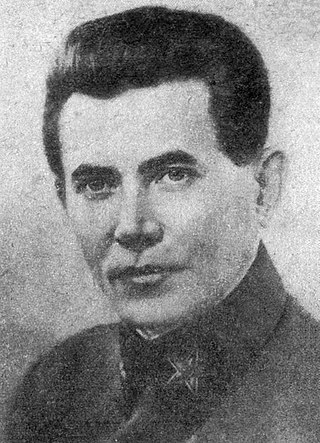
Nikolai Ivanovich Yezhov was a Soviet secret police official under Joseph Stalin who was head of the NKVD from 1936 to 1938, during the height of the Great Purge. Yezhov organized mass arrests, torture and executions during the Great Purge, but he fell from Stalin's favour and was arrested, subsequently admitting in a confession to a range of anti-Soviet activity including "unfounded arrests" during the Purge. He was executed in 1940 along with others who were blamed for the Purge.
NKVD troika or Special troika, in Soviet history, were the People's Commissariat of Internal Affairs made up of three officials who issued sentences to people after simplified, speedy investigations and without a public trial. The three members were judge and jury, though they themselves did not carry out the sentences they dealt. These commissions were employed as instruments of extrajudicial punishment introduced to supplement the Soviet legal system with a means for quick and secret execution or imprisonment. It began as an institution of the Cheka, then later became prominent again in the NKVD, when it was used during the Great Purge to execute many hundreds of thousands of Soviet citizens. Defendants in the Troika's proceeding were typically not entitled to legal aid or the presumption of innocence. Convictions usually did not include information about the actual incriminating evidence and basically contained only information about indictment and sentencing. The outcome of such trials was often determined before it even began due to targeted numbers of citizens to be executed or imprisoned in Gulag prison camps.
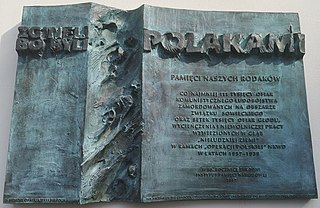
The Polish Operation of the NKVD in 1937–1938 was an anti-Polish mass-ethnic cleansing operation of the NKVD carried out in the Soviet Union against Poles during the period of the Great Purge. It was ordered by the Politburo of the Communist Party against so-called "Polish spies" and customarily interpreted by NKVD officials as relating to 'absolutely all Poles'. It resulted in the sentencing of 139,835 people, and summary executions of 111,091 Poles living in or near the Soviet Union. The operation was implemented according to NKVD Order No. 00485 signed by Nikolai Yezhov.

NKVD Order No. 00447 of July 30, 1937 was signed by Nikolai Yezhov and approved by the Politburo during the Great Purge.
Mass operations of the People's Comissariate of Internal Affairs (NKVD) were carried out during the Great Purge and targeted specific categories of people. As a rule, they were carried out according to the corresponding order of the People's Commissar of Internal Affairs Nikolai Yezhov.
NKVD Order № 00439, signed by Nikolai Yezhov on July 25, 1937, was the basis for the German operation of the NKVD in 1937–1938. The operation was the first in the series of national operations of the NKVD.
The Decree about Arrests, Prosecutor Supervision and Course of Investigation No. 81 was issued jointly by the Sovnarkom and Central Committee of the Communist Party of the Soviet Union on November 17, 1938.

Mikhail Petrovich Frinovsky was a Soviet secret police official who served as a deputy head of the NKVD under Nikolai Yezhov during the Great Purge.
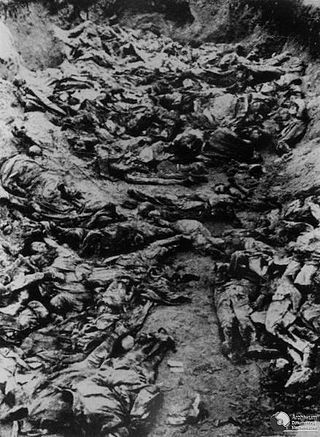
The Katyn massacre was a series of mass executions of nearly 22,000 Polish military and police officers, border guards, and intelligentsia prisoners of war carried out by the Soviet Union, specifically the NKVD, at Stalin's order in April and May 1940. Though the killings also occurred in the Kalinin and Kharkiv NKVD prisons and elsewhere, the massacre is named after the Katyn forest, where some of the mass graves were first discovered by German Nazi forces in 1943.
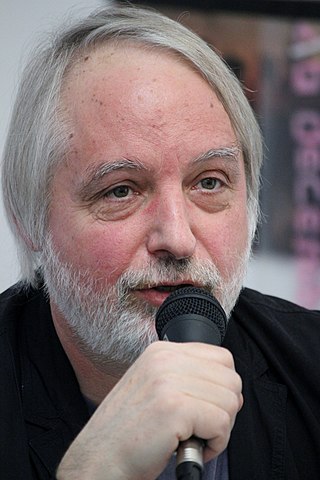
Nikita Vasilyevich Petrov is a Russian historian. He works at Memorial, a Russian organization dedicated to studying Soviet political repression. Petrov specializes in Soviet security services.
The Great Purge of 1936–1938 in the Soviet Union can be roughly divided into four periods:

Vasily Mikhailovich Blokhin was a Soviet secret police official who served as the chief executioner of the NKVD under the administrations of Genrikh Yagoda, Nikolay Yezhov and Lavrentiy Beria.

Tomasz Krzysztof Sommer is a Polish writer, journalist and publisher, editor-in-chief of weekly magazine Najwyższy Czas!. Sommer graduated from the University of Warsaw Department of Journalism and Political Science, and received his Ph.D. in sociology at the School of Social Sciences of the Polish Academy of Sciences Institute of Philosophy and Sociology.

Vsevolod Apollonovich Balitsky was a Soviet official, Commissar of State Security 1st Class of the NKVD and a member of the Central Committee of the Communist Party of the Soviet Union.

The People's Commissariat for Internal Affairs, abbreviated as NKVD, was the interior ministry and secret police of the Soviet Union from 1934 to 1946. The agency was formed to succeed the Joint State Political Directorate (OGPU) secret police organization, and thus had a monopoly on intelligence and state security functions. The NKVD is known for carrying out political repression and the Great Purge under Joseph Stalin, as well as counterintelligence and other operations on the Eastern Front of World War II. The head of the NKVD was Genrikh Yagoda from 1934 to 1936, Nikolai Yezhov from 1936 to 1938, Lavrentiy Beria from 1938 to 1946, and Sergei Kruglov in 1946.
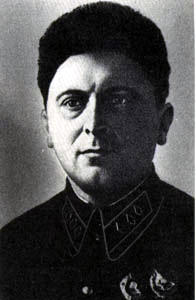
Aleksandr Ivanovich Uspensky was a senior officer of the Cheka, the GPU and the NKVD. Uspensky was both a perpetrator and a victim of the Great Purge.

Yefim Georgievich Yevdokimov was a Soviet politician and member of the Cheka and OGPU. He was a key figure in the Red Terror, the Great Purge and dekulakization that saw millions of people executed and deported.
The album procedure was a simplified procedure of extrajudicial conviction by NKVD, introduced in the Soviet Union during the Great Purge. The level of punishment of the arrested persons was decided by local organs during the investigation, the lists of the convicted were sent to NKVD headquarters, where they were approved en masse and returned for immediate application of the punishment. The name of the procedure came about because the lists collected by mid-range NKVD organs were bound into albums.
Soviet leaders and authorities officially condemned nationalism and proclaimed internationalism, including the right of nations and peoples to self-determination. Soviet internationalism during the era of the USSR and within its borders meant diversity or multiculturalism. This is because the USSR used the term "nation" to refer to ethnic or national communities and or ethnic groups. The Soviet Union claimed to be supportive of self-determination and rights of many minorities and colonized peoples. However, it significantly marginalized people of certain ethnic groups designated as "enemies of the people", pushed their assimilation, and promoted chauvinistic Russian nationalistic and settler-colonialist activities in their lands. Whereas Vladimir Lenin had supported and implemented policies of korenizatsiia, Joseph Stalin reversed much of the previous policies, signing off on orders to deport and exile multiple ethnic-linguistic groups brandished as "traitors to the Fatherland", including the Balkars, Crimean Tatars, Chechens, Ingush, Karachays, Kalmyks, Koreans and Meskhetian Turks, with those, who survived the collective deportation to Siberia or Central Asia, were legally designated "special settlers", meaning that they were officially second-class citizens with few rights and were confined within small perimeters.
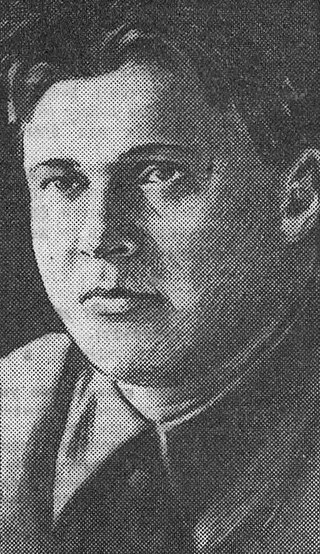
Leonid Mikhailovich Zakovsky was a Latvian Bolshevik revolutionary, Soviet politician and NKVD Commissar 1st Class of State Security.













